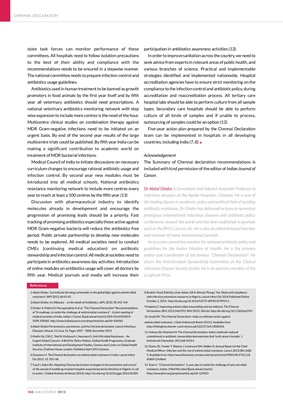
state task forces can monitor performance of these
committees. All hospitals need to follow isolation precautions
to the best of their ability and compliance with the
recommendations needs to be ensured in a stepwise manner.
The national committee needs to prepare infection control and
antibiotics usage guidelines.
Antibiotics used in human treatment to be banned as growth
promoters in food animals by the first year itself and by fifth
year all veterinary antibiotics should need prescriptions. A
national veterinary antibiotics monitoring network with step
wise expansion to include more centres is the need of the hour.
Multicentre clinical studies on combination therapy against
MDR Gram-negative infections need to be initiated on an
urgent basis. By end of the second year results of the large
multicentre trials could be published. By fifth year India can be
making a significant contribution to academic world on
treatment of MDR bacterial infections.
Medical Council of India to initiate discussions on necessary
curriculum changes to encourage rational antibiotic usage and
infection control. By second year new modules must be
introduced into all medical schools. National antibiotics
resistance monitoring network to include more centres every
year to reach at least a 100 centres by the fifth year (13).
Discussion with pharmaceutical industry to identify
molecules already in development and encourage the
progression of promising leads should be a priority. Fast
tracking of promising antibiotics especially those active against
MDR Gram-negative bacteria will reduce the antibiotics free
period. Public private partnership to develop new molecules
needs to be explored. All medical societies need to conduct
CMEs (continuing medical education) on antibiotic
stewardship and infection control. All medical societies need to
participate in antibiotics awareness day activities. Introduction
of online modules on antibiotics usage will cover all doctors by
fifth year. Medical journals and media will increase their
participation in antibiotics awareness activities (13).
In order to improve sanitation across the country, we need to
seek advice from experts in relevant areas of public health, and
various branches of science. Practical and implementable
strategies identified and implemented nationwide. Hospital
accreditation agencies have to ensure strict monitoring on the
compliance to the infection control and antibiotic policy, during
accreditation and reaccreditation process. All tertiary care
hospital labs should be able to perform culture from all sample
types. Secondary care hospitals should be able to perform
culture of all kinds of samples and if unable to process,
outsourcing of samples could be an option (13).
Five-year action plan prepared by the Chennai Declaration
team can be implemented in hospitals in all developing
countries, including India (7, 8). l
Acknowledgement
The Summary of Chennai declaration recommendations is
included with kind permission of the editor of Indian Journal of
Cancer.
Dr Abdul Ghafur is Consultant and Adjunct Associate Professor in
infectious diseases at the Apollo Hospitals, Chennai. He is one of
the leading figures in academic, policy and political field of tackling
antibiotic resistance. Dr Ghafur has delivered lectures in numerous
prestigious international Infectious diseases and antibiotic policy
conferences around the world and has been published in journals
such as the BMJ, Lancet, etc. He is also an editorial board member
and reviewer of many international journals.
He is a core committee member for national antibiotic policy and
guidelines for the Indian Ministry of Health. He is the primary
author and coordinator of the famous "Chennai Declaration". He
chairs the Antimicrobial Stewardship Committee at the Clinical
Infectious Disease Society (India). He is an advisory member of the
Longitude Prize.
CHENNAI DELCARATION
104 AMR CONTROL 2015
References
1.abdul Ghafur. Can India be the wing commander in the global fight against antimicrobial
resistance? JAPI 2012; 60:42-43
2.abdul Ghafur, An Obituary - on the death of Antibiotics. JAPI, 2010; 58:143-144
3.ghafur A, Mathai D, Muruganathan A et al. "The Chennai Declaration" Recommendations
of "A roadmap- to tackle the challenge of antimicrobial resistance" - A joint meeting of
medical societies of India. Indian J Cancer [Epub ahead of print] DOI:10.4103/0019509X.104065.
http://www.indianjcancer.com/preprintarticle.asp?id=104065
4.abdul ghafur.perseverance, persistence, and the Chennai declaration. Lancet Infectious
Diseases, Volume 13, Issue 12, Pages 1007 - 1008, December 2013
5.matlin SA, Clift C, Told M, Kickbusch I, Heymann D. Anti-Microbial Resistance - An
Urgent Global Concern. A Brief for Policy-Makers. Global Health Programme, Graduate
Institute of International and Development Studies, Geneva and Centre on Global Health
Security, Chatham House, London. Published April 2014, Geneva.
6.goossens H. The Chennai declaration on antimicrobial resistance in India. Lancet Infect
Dis 2013; 13: 105-06.
7.yusuf I, Adam RU. Adopting Chennai declaration strategies in the prevention and control
of the spread of multidrug-resistant hospital-acquired bacterial infections in Nigeria: A call
to action. J Global Antimicrob Resist (2014), http:// dx.doi.org/10.1016/j.jgar.2014.03.003
8.ibrahim Yusuf, Rabi'atu Umar Adam, Siti A Ahmad, Phang L Yee. Ebola and compliance
with infection prevention measures in Nigeria. Lancet Infect Dis 2014 Published Online
October 2, 2014. http://dx.doi.org/10.1016/s1473-3099(14)70954-5
9.hopkins S. Improving antimicrobial stewardship and surveillance: The Chennai
Declaration. BMJ 2013;346:f591. BMJ 2013; 346 doi: http://dx.doi.org/10.1136/bmj.f591
10. Gould IM. 'The Chennai Declaration': India co ordinates action against
antimicrobial resistance. J Glob Antimicrob Resist 2013;3. Available from:
http://linkinghub.elsevier. com/retrieve/pii/S2213716513000106
11. Holmes AH, Sharland M. The Chennai Declaration: India's landmark national
commitment to antibiotic stewardship demonstrates that 'truth alone triumphs'. J
Antimicrob Chemother 2013;68:1453 4.
12. Davies SC, Fowler T, Watson J, Livermore DM, Walker D. Annual Report of the Chief
Medical Officer: Infection and the rise of antimicrobial resistance. Lancet 2013;381:1606
9. Available from: http://www.thelancet.com/journals/lancet/article/piis0140 6736 (13)
60604 2/fulltext
13. Team C. "Chennai Declaration": 5-year plan to tackle the challenge of anti-microbial
resistance. Indian J Med Microbiol [Epub ahead of print]
http://www.ijmm.org/preprintarticle.asp?id=129053